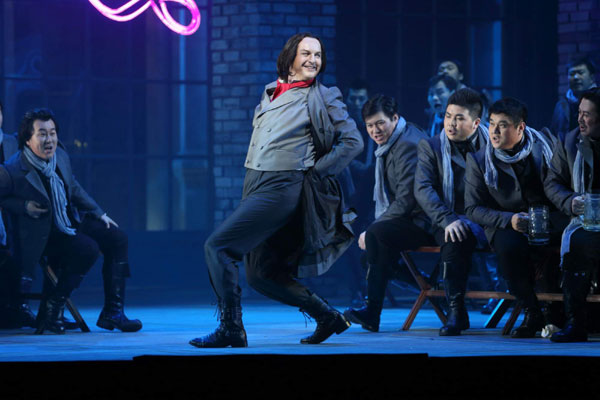Tales to savor
Updated: 2013-02-01 14:43
By Raymond Zhou (China Daily)
|
|||||||||||
 |
|
The National Center for the Performing Arts' production of the French opera The Tales of Hoffmann is being staged in Beijing and will run until Feb 3. Provided to China Daily |
Raymond Zhou finds fresh romance in Hoffmann, as three fine sopranos extol the highs and lows of love.
The Tales of Hoffmann (Les Contes d'Hoffmann) is the second French opera produced by the National Center for the Performing Arts in Beijing, but stylistically it can be said to be the first.
Carmen is certainly the most popular opera by a French composer, but in temperament it could be more Spanish than French. Now, renowned director Francesca Zambello, who brought us Carmen, has bestowed us a truly idiomatic Gallic tale ...
|
 |
I take it back. Actually, the tale is German in origin, but the musical retelling is quite French, composed by the master of operettas Jacques Offenbach. The languid phrasing expounds love in a way only the French can.
The libretto is based on several stories by German writer E.T.A. Hoffmann, who is featured as the protagonist in the opera. He is in love with Stella, an opera singer, and recalls three of his previous romances. His three targets of affection are Olympia, a mechanical doll; Antonia, daughter of a singer; and Giulietta, a courtesan, who collectively form three facets of his love object.
As portrayed by three different sopranos, the NCPA production is able to flesh out each character with her charms and vocal distinctiveness. Petya Ivanova is a wonderful coloratura whose Doll Song is rightfully the centerpiece of the evening. Lyric soprano Norah Amsellem is affecting as the tragic Antonia whose vocal prowess leads only to self-destruction. Carla Dirlikov plays the seductress Giulietta, with a physique and acting skill to match. Mezzo soprano Patricia Fernandez provides a counterpoint as Muse and Nicklausse, who can be interpreted as the rational part of Hoffmann.
It is Hoffmann himself, or rather, French tenor Jean-Francis Monvoisin, who is somewhat overshadowed by the ladies surrounding him. While highly idiomatic in diction and style, Monvoisin became progressively bland in the dress rehearsal on Jan 29. More disappointing is the famous duet Barcarolle, which appears at the beginning of Act Four in the midst of stage commotion.
 |
Bass baritone Burak Bilgili, on the other hand, is so striking as the four villains that there is a palpable rush of adrenaline when he is on stage. In the real world, he should prove to be more alluring to the ladies.
A point of debate is the order of Antonia's and Giulietta's stories. Despite the original intention of Offenbach, who did not finish the whole opera before he died, modern-day interpreters have noticed that, logically, Giulietta's story, about juvenile infatuation, should take place before the heart-breaking love with Antonia, and hence have reversed the order. Here in China, however, the so-called "successful men" tend to have Antonia-style encounters before venturing into the Giulietta territory, or more bluntly, first true love then sexcapades. So, it makes perfect sense to preserve the original order.
The set designed by Peter Davison and Charles Quiggin is not as cinematic as some other NCPA productions, most notably The Flying Dutchman. But it provides each act with the right atmosphere by simply changing the decor and ornaments on a mammoth immobile structure that functions as a backdrop. In the Nuremberg tavern scenes that bracket the three love stories, giant barrels jut out from the wall, and chorus members hold beer jugs high while singing of great wine.
The Tales of Hoffmann opened at NCPA on Jan 31 and will run through Feb 3. A Chinese cast in principal roles rotates with the imported artists. The performances are conducted by Stephen Barlow.
Contact the writer at raymondzhou@chinadaily.com.cn.
Related Stories
Chinese art maintains distinctive presence in the Asian art market 2013-01-29 10:43
Inner Mongolia hosts art auction 2013-01-25 15:34
China Plum Blossom Art Center will open to public 2013-01-25 09:56
Zhang Tonglu's cloisonne art works exhibited in HK 2013-01-23 10:07
Today's Top News
Police continue manhunt for 2nd bombing suspect
H7N9 flu transmission studied
8% growth predicted for Q2
Nuke reactor gets foreign contract
First couple on Time's list of most influential
'Green' awareness levels drop in Beijing
Palace Museum spruces up
Trading channels 'need to broaden'
Hot Topics
Lunar probe , China growth forecasts, Emission rules get tougher, China seen through 'colored lens', International board,
Editor's Picks

|

|

|

|

|

|





